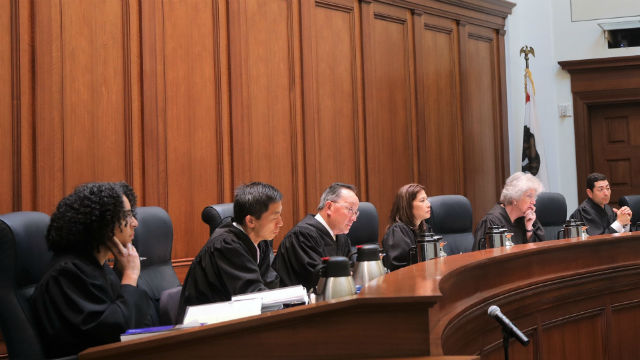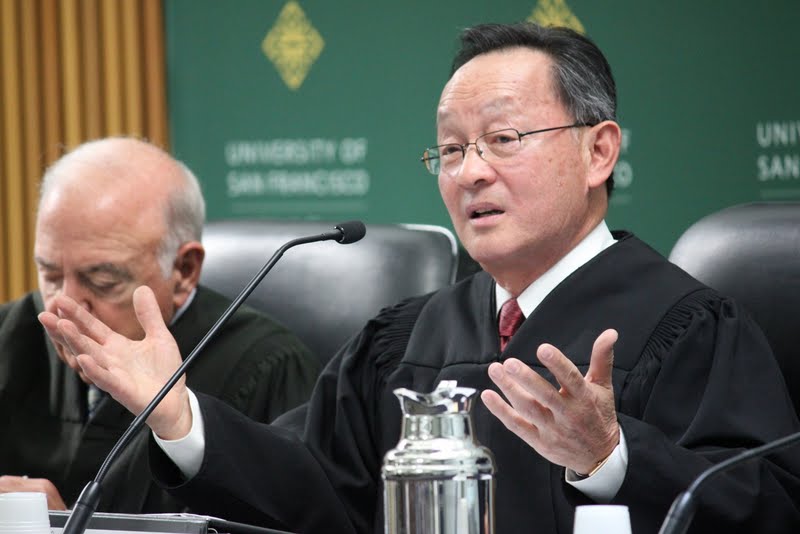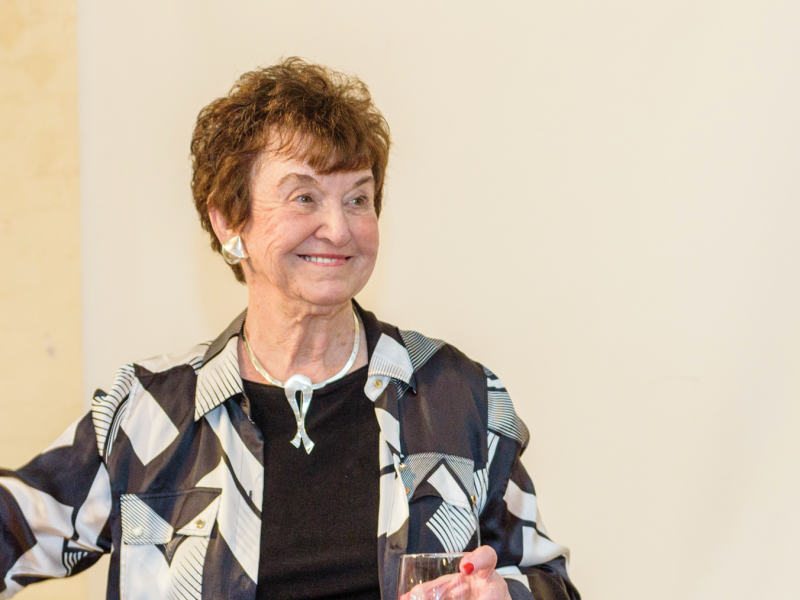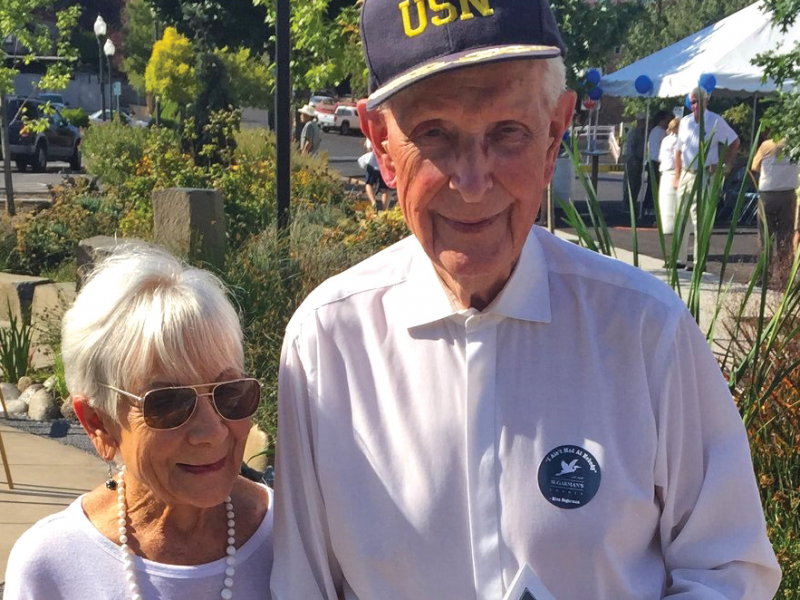The Klamath Basin is home to little towns filled with big hearts. The Klamath Community Foundation salutes the hometown heroes who show us how Klamath put them on the road to great achievements. Because the big world starts in a small town.
Justice Ming W. Chin, the longest-serving sitting member of the California Supreme Court, announced in January that he will step down from the bench on August 31, 2020, after serving nearly 25 years on the highest court of the largest state in the union.
Known for his work ethic, Chin wrote six majority opinions in his first eight months on the bench. In total Chin authored 350 majority opinions and more than 100 separate opinions, including landmark decisions on DNA evidence, hate crimes, toxic tort insurance coverage, and surrogate parents. Retired California Supreme Court Justice Marvin R. Baxter said, “Justice Ming Chin’s professional career as a lawyer, trial judge, appellate justice, and member of the California Supreme Court has been outstanding. He leaves a lasting legacy in the law that few can match.”
That legacy began some 65 years ago as a twelve-year-old boy, the child of Chinese immigrants, sitting in a Klamath County courthouse watching the lawyers at work.
Chin describes his story as beginning in the small Chinese village of Fu San in Dow Moon country, just south of Canton. His 18-year-old father, Wong Sam, answered the call of the California gold rush, reaching the United States in 1913. Chin said, “He came without family, without friends, without language. And yet, in this wonderful land of hope, freedom, and opportunity, he was able to carve out a remarkable life for his family.”
After four years working in Stockton, California potato fields “for just two to five dollars a month,” Wong Sam returned to China for his bride. By day the couple continued laboring in the Stockton potato fields to support their old family in China and their new
family in America. By night they attended classes in San Francisco to learn English. In 1936 they found their way to Klamath Falls where, the Herald and News reported, “they farmed 40 acres of potatoes. The top quality sold for 25 cents a sack and number two’s went for 15 cents.” With their hard-earned savings they bought the land.
Just eleven years later, the 1947 Herald and News featured the family stating “at present Wong Sam farms approximately 400 acres of potatoes and barley and has been a potato buyer and shipper for the past nine years.” And by 1956 the newspaper reported on Wong Sam’s 61st birthday party, celebrated at the Pelican Party Room with 140 friends including Circuit Judge David Vandenberg, Klamath Falls Mayor Paul Landry, Merrill Mayor Robert Walker, and State Senator Harry Boivin. The newspaper lauded “one of Klamath County’s best-known ranchers” and noted that Wong Sam now farmed over 800 acres.
But the couple’s arduous ascent was riddled with setbacks and heartbreak. The couple had eight children, Mary, George, Joe, Betty, Jack, Jeanne, Tom, and the youngest, Ming. In 1944 Mary died in an automobile accident. Two years later, when Ming was just four years old, a fire consumed their house. The newspaper describes a heroic rescue attempt where “neighbors tied ropes to would-be rescuers,” but nine-year old Jack died. Reflecting on the tragedy later in life, Chin wrote, “I learned at a very young age that people are more important than things.”

Young Ming Chin witnessed a mother and father who never gave up. He describes parents who worked hard to rebuild their lives, coupled with living in a community where neighbors took care of each other. “It did not matter that we were the only Asian American family in the community. Our neighbors from the farm next door to us were away on their honeymoon when they heard about our tragedy. They immediately returned and gave us the keys to their home, where we stayed until we got back on our feet.” Even the newspaper put out a plea on behalf of the family stating “anyone having room [to accommodate the family] is asked to contact Ed Crawford of Merrill, friend of the Sam Wongs.”
Exactly one year later in October 1947, Ming Chin’s sister Betty was named queen of the Klamath Basin Potato festival. The newspaper not only featured the new spud queen but also her father’s journey from China, praising his hard-work, “ambitious nature,” and accomplishments. The article called the family “proof that America is the land of opportunity.”
By the age of nine, young Ming Chin worked seven days a week on his family’s farm, learning to operate the tractor, jeep, hay baler and irrigation systems. By the age of 14 he had mastered the combine. But he loved reading more than farming and remembers
how his father called him “Mr. Lincoln” because he always had a book in his hand. He describes getting so engrossed in an Abraham Lincoln biography “that I neglected my duties in the field, and the whole field was flooded. My father was not amused. He had a few choice words for me, but he never told me to stop reading. I think that incident told him early on that farming was not going to be my strong suit.”
The three youngest siblings, Jeanne, Tom, and Ming, attended Sacred Heart Academy in Klamath Falls, living at the boarding school run by the Sisters of St. Francis. Chin recalls that “the Sisters were wonderful teachers as well as great role models.”
But by the time Chin entered junior high school, Sacred Heart ended its boarding program. So to continue at Sacred Heart Academy, Ming Chin lived with “a friend of my father’s, Judge David Vandenberg.” He describes Judge Vandenberg as “one of the most highly respected jurists in the state. He was a man of character. He was a man of wisdom. He not only inspired me to become a judge, but he also taught me everything a good judge ought to be.”
In a 2019 interview, Chin said, “Judge [Vandenberg] gave me law books to read, he took me down to court, and I got to watch jury trials. He handed me the gun in a murder case. He gave me Blackstone [Commentaries on the Laws of England] to read when I was 11.”
Ming Chin went on to take college-preparatory classes at Bellarmine Catholic high school in San Jose. He received both his undergraduate and law degrees from the University of San Francisco. Judge Vandenberg wrote a law school letter of recommendation for him, which he keeps in his chambers tucked inside the frame of a signed photo of Vandenberg.
Chin served two years as a Captain in the U.S. Army, including a year in Vietnam, where he learned “what duty, honor, country, and leadership are all about.” It’s also where he earned a Bronze Star. But in a 2013 speech, Chin made light of his experience serving seven miles south of the DMZ in Vietnam, joking that “my brother, Tom, was in the army at the same time. Interestingly, there is a rule that only one sibling will be sent to a given war zone – I ‘ve never let Tom forget it.”

And though Chin must have winced from the “extreme racial prejudice” his immigrant parents at times faced, he remembers his fellow soldiers as “outstanding young men from every part of the country, of every race, color, and creed, who didn’t care about the color of your skin, but just wanted to know if you could be counted on when the going got tough.”
Chin went on to a distinguished legal career serving as a prosecutor, practicing in a private law firm, sitting on the Alameda County trial bench and serving on the California Court of Appeal. But at his 1996 California Supreme Court swearing-in ceremony, his thoughts returned to the friends and family who shaped his character and aspirations. He said in a quivering voice his only sorrow was that his parents did not live to see him attain the honor. “Only in America could the son of a Chinese immigrant farmer rise to sit on this state’s highest court.” He also paid tribute to Judge Vandenberg, who died when Chin was in law school, saying “I wonder what he would say now.”
A few months after his appointment to the California Supreme Court, Justice Ming Chin swore in the new Los Angeles Municipal Court judges. Chin reminded the new judges to “treat everyone with respect, regardless of whether they are rich, poor, well-dressed or not, or speak English well.” He told the new judges of a jurist in his hometown who “spent hours in conversation with a man who didn’t speak English well and had not gone to school. That man was my father,” Chin said. “If you are fair and keep an open mind, the son of an immigrant who does not speak English well might be impressed with your demeanor, and inspired to do great things.”
Ming Chin’s tremendous success in life is a testament to the man, his hard work and his talents. But it also is a testament to his family, who sacrificed so much that their children might have a better life. “My parents came to this country, not demanding the best that America had to offer, but willing to accept the worst because even that was so much better than life in their homeland. As it turned out, America gave them her best, but it was not without pain, it was not without struggle, and it was not without disappointment.”
Chin’s success is also a tribute to our community, which welcomed newcomers, turning them first into neighbors and then into friends. That spirit continues in the Klamath Basin to this day. And that spirit is the foundation of our future success.
Written By Heidi Neel Biggs
Heidi Neel Biggs is the Executive Director of the Klamath Community Foundation who, having studiedcomparativelawattheE astChinaUniversityofPoliticsandLawinShanghai,finds Justice Chin’s story extraordinarily inspiring.





